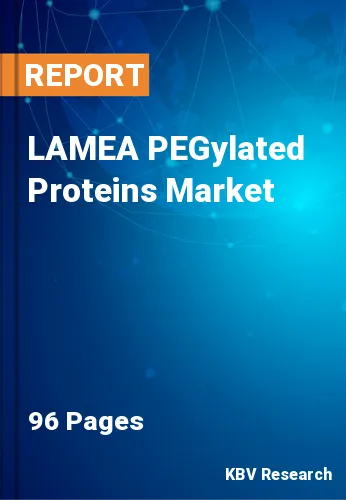
The Latin America, Middle East and Africa PEGylated Proteins Market would witness market growth of 14.4% CAGR during the forecast period (2022-2028).
The pharmacological benefits and relevance of PEGylation of proteins also include greater drug stability, little loss of biological activity, decreased dosage frequency, and improved drug solubility. Cimzia, Macugen, Mircera, Somavert, Neulasta, and Pegasys are some of the pegylated medications that the FDA has approved. These medications are effective in the treatment of a wide range of conditions, including Crohn's disease, anemia in chronic renal disease, Acromegaly, age-related macular degeneration, hepatitis C, and neutropenia during chemotherapy.
PEG molecules are utilized in the conjugation of nanoparticles for anti-cancer medication delivery systems. By regulating the discharge of native protein from the conjugates into the circulation, the controlled releasable PEGs have been designed to prevent any loss of efficacy. The care of various chronic diseases, such as cancer, leukemia, rheumatoid arthritis, severe combined immunodeficiency disease, Crohn's disease, and hepatitis C, has been improved by the PEGylation of therapeutic proteins.
The most significant PEGylated medications are pegfilgrastim, pegaspargase, certolizumab pegol, pegademase bovine, pegvisomant, pegaptanib, and interferons. Determining clinically meaningful anti-PEG antibody titers is necessary to control the risk of adverse events following patient exposure to PEGylated medications since the formation of anti-PEG antibodies may decrease the efficacy and safety of PEGylated therapies.
The region's HIV epidemic is still predominantly concentrated in at-risk groups, with MSM and transgender women (TGW) bearing the brunt of the disease. The difficulties of late commencement and inadequate adherence to treatment continue. Regarding prevention, new research on PrEP willingness in important populations has yielded encouraging findings. At the same time, national health systems are increasingly adopting PrEP through implementation projects. Brazil's first year of offering PrEP in numerous cities across the entire nation provides a peek at real-world PrEP uptake.
The Brazil market dominated the LAMEA PEGylated Proteins Market by Country in 2021, and would continue to be a dominant market till 2028; thereby, achieving a market value of $38.1 million by 2028.The Argentina market is exhibiting a CAGR of 15% during (2022 - 2028). Additionally, The UAE market would showcase a CAGR of 14.1% during (2022 - 2028).
Based on Product & Services, the market is segmented into Consumables and Services. Based on Type, the market is segmented into Colony-stimulating Factor, Interferons, Recombinant Factor VII, Erythropoietin and Others. Based on End-user, the market is segmented into Pharmaceutical & Biotechnology Companies, Contract Research Organizations (CROs) and Academic & Research Institutes. Based on Application, the market is segmented into Cancer, Autoimmune Diseases, Hepatitis, Multiple Sclerosis, Hemophilia, Gastrointestinal Disorders and Others. Based on countries, the market is segmented into Brazil, Argentina, UAE, Saudi Arabia, South Africa, Nigeria, and Rest of LAMEA.
Free Valuable Insights: The Global PEGylated Proteins Market is Predict to reach $2.1 Billion by 2028, at a CAGR of 11.3%
The market research report covers the analysis of key stake holders of the market. Key companies profiled in the report include Merck Millipore (Merck KGaA), Thermo Fisher Scientific, Inc., NOF Corporation, JenKem Technology Co. Ltd., Creative PEGworks, Celares GmbH, Quanta BioDesign, Ltd., Biomatrik, Inc., Iris Biotech GmbH, and Laysan Bio, Inc.
By Product & Services
By Type
By End-user
By Application
By Country
Our team of dedicated experts can provide you with attractive expansion opportunities for your business.
